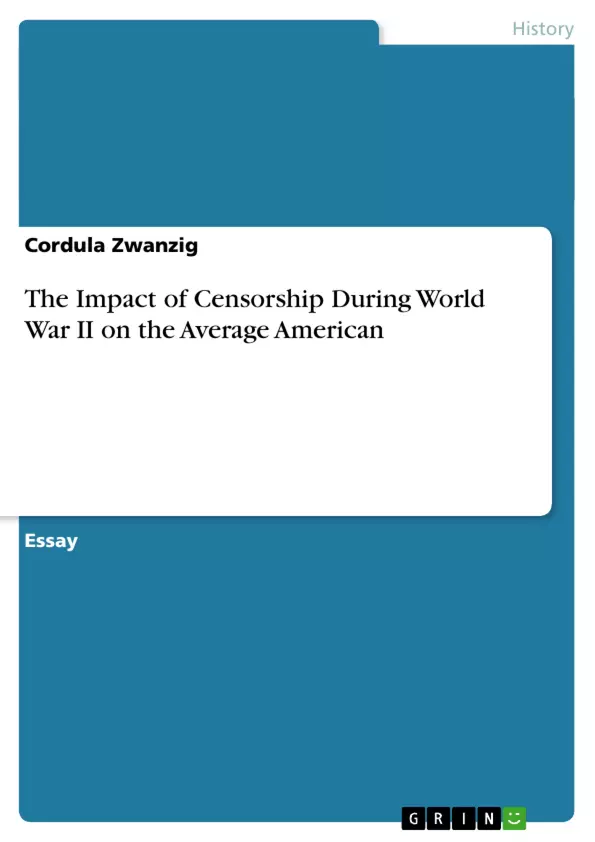“The war came as a great relief, like a reverse earthquake, that in one terrible jerk shook everything disjointed, distorted, askew back into place. Japanese bombs had finally brought national unity to the U.S.”.
All nations participating in the Second World War used one or another strategy to commit their countries to war. Government-conducted manipulation of informing a people can be differentiated into an active channel, propaganda, and a non-active one, censorship. Even though, propaganda and censorship usually cohere, this essay shall only throw a light on how US-American censorship shaped the average citizen’s perception before, while, and after World War II.
Inhaltsverzeichnis (Table of Contents)
- The Impact of Censorship During World War II on the Average American
- Censorship as a Tool of Control
- The Pre-War Media Landscape
- The Impact of World War I
- The Rise of Isolationism
- The Shift to War
- The Office of Censorship
- The Strategies of Censorship
- The Voluntary Censorship Code
- The Impact on Public Perception
Zielsetzung und Themenschwerpunkte (Objectives and Key Themes)
This essay examines the impact of censorship on the average American during World War II. It explores how government-conducted manipulation of information shaped public perception before, during, and after the war.
- The role of censorship in shaping public opinion during wartime
- The impact of pre-war media landscape on censorship effectiveness
- The influence of World War I on American attitudes towards censorship
- The relationship between censorship and propaganda
- The impact of censorship on American public perception of the war effort.
Zusammenfassung der Kapitel (Chapter Summaries)
The essay begins by defining censorship as a form of mass media control used by governments to protect national security. It then explores the pre-war media landscape in the United States, highlighting the widespread influence of newspapers, magazines, radio, and cinema. The essay discusses the impact of World War I on American attitudes towards censorship, highlighting the public's fear of manipulation and the rise of isolationist sentiment.
The essay then examines the shift to war, analyzing the impact of Pearl Harbor and the subsequent creation of the Office of Censorship. It discusses the strategies employed by the Office of Censorship, including the "strategy of truth" and the use of voluntary censorship. Finally, the essay explores the impact of censorship on public perception, highlighting the influence of censorship on public understanding of the war effort and the role of censorship in maintaining morale.
Schlüsselwörter (Keywords)
This essay focuses on censorship, propaganda, public perception, media control, World War II, American history, Office of Censorship, and the impact of war on society.
Frequently Asked Questions
What is the difference between propaganda and censorship?
Propaganda is an active channel of government-conducted manipulation used to inform or influence people, while censorship is a non-active strategy used to control or suppress information.
What was the role of the Office of Censorship during WWII?
The Office of Censorship was created following the attack on Pearl Harbor to manage the flow of information and protect national security through various strategies, including the "strategy of truth."
How did World War I affect American attitudes toward censorship?
The experience of World War I led to a public fear of manipulation and a rise in isolationist sentiment, making the government's approach to information control more complex in WWII.
What was the "Voluntary Censorship Code"?
It was a set of guidelines where media outlets (newspapers, radio, etc.) voluntarily agreed to restrict certain information to aid the war effort without direct government enforcement.
How did censorship impact the average American's perception of the war?
Censorship shaped the public's understanding of the war effort, maintained national morale, and ensured that sensitive military information did not reach the enemy.
Which media platforms were most affected by censorship?
Censorship heavily influenced newspapers, magazines, radio broadcasts, and cinema, as these were the primary sources of information for the public at the time.
- Quote paper
- Cordula Zwanzig (Author), 2013, The Impact of Censorship During World War II on the Average American, Munich, GRIN Verlag, https://www.grin.com/document/268037



